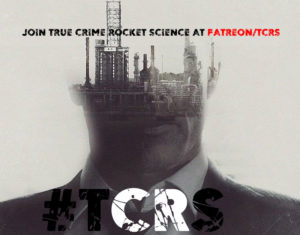TRANSCRIPT
Hello, and welcome to True Crime Rocket Science.
Today’s episode deals with three huge breakthroughs in the 6th hour of the 7 hour interrogation. We’re going to play Devil’s Advocate. What happens when we do that? We do we see when we look at the interrogation from the perspective of a defense case? Had this ultra high-profile case ever gone to trial, we will see there’s a moment, a precise moment where Watts still had the upper hand against law enforcement. If he had called a timeout then, he would have kept the upper hand. But he didn’t. Instead he voluntarily gave that advantage away. He threw in the towel on his own story, on his own elaborate effort to get away with murder.
Now, although we’ll be looking at this mostly out of context, we need to review a skeletal framework as a bare minimum for how things got to where they did. We’ll start by simply acknowledging that by Wednesday afternoon, following the polygraph, law enforcement had the goods on Watts affair. They knew he had a girlfriend, they knew she was a co-worker of his at Anadarko, they knew it was a recent affair, they knew the pair had been intimate, and they knew he’d been lying to her as well.
Nichol Kessinger deserves credit for this. She sat down for her first interview with two FBI agents at around midday on Wednesday, August 15th. It was as a result of this interview that the Feds were able to pass their intel on to Coder and Lee, and they had the confidence to exert some real pressure on Watts. They’d been buttering him up for hours, letting him waste time and have their say. They gradually nudged him here and there, but they had no idea how much Watts was hiding. Kessinger’s statement provided them with a least a little certainty in this regard.
1st Breakthrough
The first breakthrough happens at around the 7-minute mark, in the 6th hour on the interrogation. We’re going to spend some time dealing with the first ten minutes leading up to the breakthrough, and the three minutes following.
Now, in order to get to the finish line, in order to get Watts to willingly volunteer information, rather than recoil, withdraw and lawyer up, they had to play nice, but also get him to admit to the affair. If they told him they knew, some trust that had developed would be lost. By Watts admitting, he was able to save face and in a weird way, as law enforcement they could seem almost graceful in their beneficence. They could also extend clemency for the affair, which would make Watts wander if they’d be okay with him having done worse stuff.
The first breakthrough comes immediately after the polygraph, when Coder and Lee return to the cubicle together. Unbeknownst to Watts, while he has been stuck in the room – at that stage for around 5 hours – both agents have been appraised with more information, and have been able to refresh themselves with a change of scenery, and also consult with each other, and others, on the way to approach Watts during the next phase, bearing in mind what they know now about Kessinger.
Probably, they agree to be firmer, but not too firm. They decide to step it up a gear, while being prepared to back off if Watts gets too riled up.
Let’s start at 16:00 sharp, and listen in to the first 105 seconds when the agents start off for their next session, immediately leading up to the breakthrough.
INTERROGATION AUDIO 1
It takes another five minutes of softening Watts up to get him to admit to the affair after this point. Let’s take a look at some of the dialogue in that conversation before listening to it directly.
LEE: But you know they’re not coming back home…
WATTS: I know in the back of my head, I hope they come back home.
LEE: But you know they’re not.
WATTS: I hope they come back home.
LEE: Mmm.
WATTS: I don’t know they’re not coming back home.
CODER: Chris, Tammy and I are confused, and this is what we’re confused about. We’ve told you that we’ve done some work overnight, we’ve got a lot of leads, okay. We know a lot more than you think we do. And here’s where we’re confused. You’re this great guy. I’m not just telling you that, okay. I’m telling you that because everyone tells us that. We can’t find anyone to say anything bad about you. “Chris is a great guy. He’s a good father. He’s a good man.”
LEE: Mmmm.
CODER: We’re confused as to why you’re not taking care of your beautiful children…
WATTS: How I’m not taking care of them right now…?
Here, Coder is seeding the thought in Watts’ mind. He know it’s triggering Watts, and he knows it’s triggering Watts in terms of guilt – about the affair. But he needs Watts to acknowledge it. Watts does want to acknowledge it, he just doesn’t want to get into trouble. The agents must soothe him, appear as therapists temporarily rather than cops trying to nail his ass to post.
CODER: Where are they?
WATTS: I don’t know where they’re at. I honest – I do not know where they are at. If I could have my babies back home right now, I would. I want them back. I want everybody back. [With emphasis] And that’s the God’s-honest truth.
Then, incredibly, 55 long seconds tick by. These have to be seen, and felt to believed. This is ratcheting up the pressure. Two agents staring at Watts, Watts rebuffing them, and then the clock ticking out the time as the standoff continues. In a sense, this moment speaks volumes for the interrogation. Watts isn’t giving them anything, so it’s pointless even talking if he’s going to continue pontificating. This protracted silence not only indicates his resolve, but theirs. And we know ultimately who would win the standoff.
The amazing thing is Watts wanted to take them on; he thought he could outwit them just as he had outwitted his wife, her friends, Kessinger to an extent, and even his colleagues. If Watts wasn’t so pigheaded, he could have looked at the situation differently, and simply registered that they were onto him, and called the whole thing off.
There’s a reason, a few reasons actually, that Watts didn’t lawyer up.There’s also a reason Watts thought he could bullshit his way out of a sticky situation. Maybe one at a time, Watts was an agile liar. But not like this. Not one against two, for hours, and with the disadvantage of others providing crucial intel on him there and then.
At 6:42, after Coder hits Watts with the Two Chris’ speech, he finally confronts Watts as on the chin as he dares, about Watts “lying about something else”. But instead of denying it, Watts admits it.
Watts couldn’t admit to the cops he was having an affair. He couldn’t face Shan’ann on the same issue either.
2nd Breakthrough
The second breakthrough starts happening at about 16:34, about 24 minutes after the first. It involves Watts talking to his father, but it’s not just that. First of all, Watts was so worn down by the interrogation he was close to saying, “Please stop”. Instead, the interrogators skillfully offered Watts the opportunity to talk to his father as an exit.
Even after this idea was mentioned, the cops spoke to Watts for a further ten minutes, holding the offer of talking to his dad – a friendly face – as a psychological carrot.
Even so, this strategy was an enormous risk. They’d been piling on the pressure, and so, if they stepped out of the room, they ran the real risk of Watts catching a breather, getting a second wind, and worse, shutting down or putting a stop to the interrogation. There was also an arguably even bigger risk that Ronnie might talk some sense into his son, and as we’re about to see, that’s exactly what happened.
AUDIO WITH CODER AND LEE PRIOR TO RONNIE ENTERING THE ROOM
The second breakthrough has two layers, the first is Watts talking to his father, and the second, the real breakthrough, is that Watts elects to confess to his father right out the gate. Coder and Lee did such a great mindjob on Wwatts, that they framed Watts talking to his dad as a conversation about what happened. And then, that’s precisely what he did. He didn’t have to.
At about 16:38 the agents leave the room, and as they do, Watts removes his glaves and digs his face into the left shoulder of his shirt, wiping away tears. These are real tears. This is real emotion. Watts doesn’t want his father to see it.
Five long minutes tick by. Watts’ father doesn’t enter the room immediately. Watts is given five long minutes to stew under the intense ticking of the clock, still stuck inside the claustrophobic cubicle. Clearly, during this 5 minute interval Watts’ father is also being given instructions. Ronnie is also being told what to talk about, and expressly that his son is ready to tell him, wants to tell him what happened.
They may also tell Ronnie that he can only talk to his son on condition that they talk about what happened. It’s late in the day, it’s urgent, it’s important they find out what happened to the girls, to Shan’ann, and so Watts needs to tell him.
It’s not surprising then that Ronnie’s first words to his son are:
“Do you want to tell me what’s going on…or?”
AUDIO OF FATHER AND SON
The style of the “interrogation” between father and son is quite different. Both speak in low tones, almost conspirationally, perhaps hoping what they say won’t be recorded. Ronnie is quite much of the time, making short, simple, leading type statements and often simply repeating what his son says. What the agents hadn’t been able to achieve in over five hours, Watts’ father achieved in five minutes.
Curiously, and this has been overlooked by many speculating over the case, when Watts tells his father – volunteers – about the affair, his father isn’t surprised. It’s as if Ronnie already knew about it. Watts also tells his father:
“I told her about the separating…and everything about that…”
He’s implying he told Shan’ann about the affair, and that this is why Shan’ann freaked out. And then when she freaked out, he freaked out.
What’s incredible about this moment, this second breakthrough, besides the contents of it, is that, in effect Watts defaulted from the enterprising Romeo to a zombie simpleton who did as he was told. He was used to taking orders, and in this instance, he did just that. He confessed to his father that all three of them – Shan’ann, Bella and Ceecee were dead, and what’s more, all three had been murdered.
Breakdown/3rd Breakthrough – The Critical Moment
The first breakthrough – Watts voluntarily admitting to the affair – took place at about 16:07. The second – Watts admitting to his father that he killed Shan’ann, and that his children were both dead – took place 36 minutes later, from 16:43 onwards. But the real breakthrough was the third, when, after confessing over a span of eleven minutes, the agents worst fears were realized, and Ronnie started advising his son to get a lawyer.
The agents scrambled. Within about ten seconds of Ronnie telling Watts-
“Well, you gotta get a lawyer…see…what we can do…I could arrange [garbled]…”
-the agents were back in the room. In fact as Ronnie uttered the word “arrange”, Watts lifted his head slightly and made eye contact with his father.
Lee barged in first, but was also careful to ask permission. Ronnie reluctantly accepted the intrusion, saying, “Come on in. ” This was a fatal mistake made by Watts father. He could have said, “Give us a minute.” Instead, Lee advanced, and reached out to Watts. At this time Ronnie had his hand on Watts left arm, or shoulder, while Lee placed her hand on his right shoulder.



By doing this, Lee immediately broke the connection between father and son. For the first time during the entire interrogation, she leaned over Watts and rubbed his back just as she’d seen his father doing.
This may not seem a big deal, but consider the facts. Watts has just admitted murdering his wife. Lee then enters, and comforts a man she is likely repulsed by, and perhaps even afraid of. But she can’t show it. She has to hold her nerve, and keep Watts in the game, and on their side.
The part that’s easy to miss is this.:
If Watts had called it; if the interrogation had stopped at this point, his confession would likely not be admissible in court, simply because most of it is barely audible. Also, since no law enforcement officer was in the room, even if the audio was admitted as evidence, Watts and his father could agree between themselves that certain words captured on audio weren’t what they had actually said to one another.
In short, Watts’ confession was a giant leap forward in terms of the investigation, because he’d just admitted firsthand knowledge that three members of his family were dead. But the confession itself, at this point, was legally worthless. What Lee and Coder needed to do was get Watts on the record. They needed him to forget about getting a lawyer, and get back to talking to him, while playing the delicate game with Watts’ father still in the room. So they had to reassure him as well.
When Lee sits down, she sits directly beside Watts, her elbow almost touching his. Coder sneaks in and sits down silently in the corner. And then immediately, Lee asks Watts the vital question:
“Will you tell us what you told your dad?”
This is the critical moment. If they’d asked Ronnie to step out of the room, perhaps Watts would have had a moment to regain his composure. Perhaps without his father in the room he may have felt the wall return, and balked. But with his father’s hand on his shoulder, and Lee staring in, and Coder in the room, Watts probably felt like he had no choice.
He did have a choice. Had he said no, at this point, the defense could have had a field day with this case. Incredibly, just because Lee asked him nicely, and treated him – now a self-confessed murderer, with warmth – he did what he thought was reasonable. He lied about Shan’ann killing the children, but admitted the “lesser” evil in his mind – killing Shan’ann. What he was describing was a kind of involuntary, justifiable homicide. If, in his story, he’d claimed he’d tried to rescue the children, tried to perform CPR, this too could have saved him. It certainly helped Oscar Pistorius when he claimed the same thing.
Oscar Pistorius ‘carried dying Reeva Steenkamp downstairs and tried to resuscitate her’ – The Telegraph
Oscar Pistorius Tried To Resuscitate Reeva Steenkamp After He Shot Her – Jezebel
In a recent episode of Homicide Hunter, a guilty suspect sitting in a lounge, while the cops searched his home, explained his reluctance to ask for a lawyer. He said he preferred to let the cops search, because the other options was worse:
If you hire a lawyer you look guilty.
Appearances can be deceiving.

Of course, in a situation like this, if you don’t hire a lawyer – and you’re guilty – you can get yourself into a world of trouble, and end up looking even worse.
We know now that Watts had also lied to his father here, telling him he’d “only” killed Shan’ann. So at this stage he thought he had the upper hand, and when agent Lee soothed him, it reinforced this notion. He decided to stick to his game plan, because pinning the crime on Shan’ann seemed like a better idea than getting a lawyer. Watts’ brain was so scrambled by now, he forgot that whatever the details, he’d just admitted to committing murder, to his father, and now he was about to do the same with the two agents, on the record. He may have figured admitting to Shan’ann’s murder wasn’t a big deal, after all, when he admitted it, everyone understood, and hell, he understood why he’d done it.
But he’d made a very crucial error. If he could fool them with appearances, they could do the same to him, and they did.
We will review the crucial third breakthrough here. Listen out for Watts and his father mentioning the affair and Watts repeating that Shan’ann knew about it anyway…
Watts couldn’t admit to the cops he was having an affair.
He couldn’t face Shan’ann on the same issue either.
Just as he couldn’t face the truth in this moment about what he’d done [killing the children], he couldn’t face Shan’ann with the truth either. And so, in the same way he sneakily blamed the deaths of the children on Shan’ann, when he confronted Shan’ann after she arrived home from the airport, he did it in the same sneaky, underhanded manner.











Leave a Reply